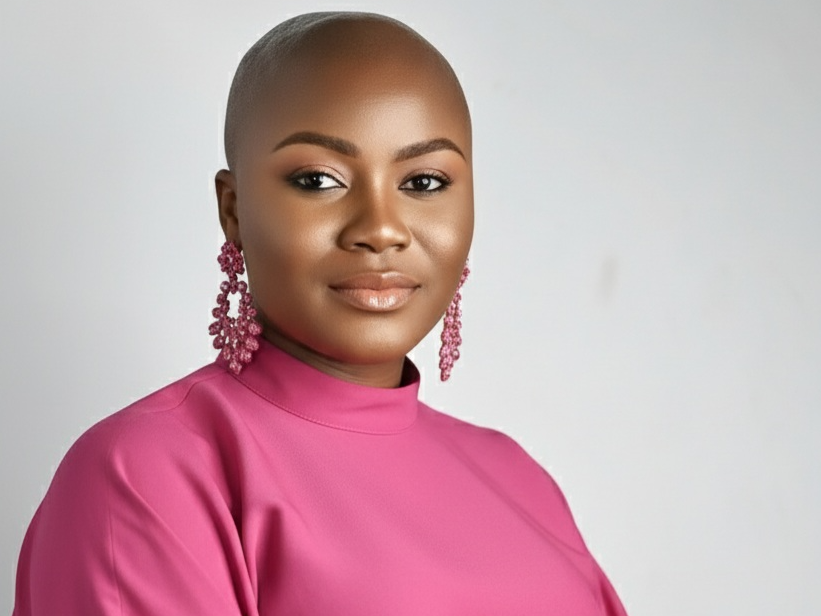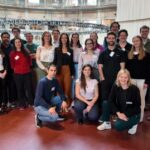Elizabeth Ugwoma Awo-Ejeh was soon to turn 25 when she discovered a lump in her right breast. She had recently married and was halfway through an undergraduate degree at the National Open University of Nigeria.
Plus she had a thriving music career going. Now a growing tumour in her left breast seemed to threaten not only her life but also her career.
Growing up in northern Nigeria, in a family with no medical history of cancer, she was unfamiliar with the disease. Her story would, years later, shed light on not just breast cancer in young Nigerian women but also the fatal delays caused by misdiagnosis and limited awareness.
So, she dismissed the swelling as a hormonal change from her menstrual cycle initially. But as months passed and the lump persisted, a growing sense of unease gnawed at her.
At her husband’s insistence, she visited the hospital, where the doctor assured her that the lump was nothing serious.
If the doctor’s remarks eased her fears, it wasn’t for long. The lump began to grow, accompanied by a dull, persistent pain. Next, she noticed a milky discharge from her nipples. This time, she went for an ultrasound, which suggested a fibroadenoma, a benign lump that often shrinks on its own.
Five months later, the milky discharge turned bloody. Her fears heightened. A proper biopsy eventually revealed what she had long feared.
She remembers the hospital’s sterile smell, the doctor’s probing questions, the heavy silence that preceded his pronouncement of invasive carcinoma: stage two breast cancer.
The diagnosis swept her like a sandstorm, leaving her numb and empty. “Do people survive this?” she wondered. “Am I going to survive?”
So overwhelming were her fears that she had begun contemplating her funeral. To quell Awo-Ejeh’s growing despair, the doctor related the story of American actress Angelina Jolie, who had undergone a double mastectomy after learning of her genetic risk for breast cancer.
Yet all of the doctor’s encouragement fell on deaf ears. The flood of unsolicited advice was overwhelming. Some urged her to skip chemotherapy; others recommended herbal supplements.
One church member related his wife’s experience with herbal treatments, allowing the cancer to spread.
“He encouraged us to go back to the hospital and start treatment,” Awo-Ejeh recalls. “That was another motivation for me to even begin.”
Desperate for clues, she scoured the internet and later stumbled on a video of a cancer survivor sharing her story.
For the first time since her diagnosis, her world brightened. “In my mind, I was like, really? Do people survive this monster?” That clip, Awo-Ejeh explains, deepened her resolve to return to the hospital for treatment.
But, as with many survivors, treatment was long and expensive. “We were moving up and down, looking for money to start,” she says.
She underwent a mastectomy in her right breast, followed by eight rounds of chemotherapy and twenty-five radiotherapy sessions.
Each cycle cost around N700,000. One bill even amounted to six million naira. Distraught, she broke down and prayed, “God, if you heal me, I will speak up to help other girls.”
Her husband supported her during the treatment regimen, which took a severe toll on her academics and mental health. Amidst this, some people urged her to stop chemotherapy and pray instead, describing cancer as a curse. These misconceptions haunted her more.
On December 31, 2022, Awo-Ejeh shared her cancer diagnosis on her social media. A flood of reactions trailed her post. Many people expressed shock at how someone so young and energetic could develop breast cancer. But her openness resonated so deeply with many that they donated to her treatment.
After reading Awo-Ejeh’s post, one Ghanaian woman reached out to her, saying that she had just been diagnosed with cancer too.
“She asked if I could hold her hands while we go through this journey, because I’ve inspired her,” Awo-Ejeh recalls, adding that the lady had completed her chemotherapy. “She’s doing fine.”
Awo-Ejeh takes pride in that impact as she herself continues with her hormonal therapy, expected to continue for the next five years.
Healing, she says, is a long process filled with days of strength and fatigue. Along with eating healthily and spending time with her husband, she meditates and writes songs. Music reminds her that she is still alive for a purpose.
Awo-Ejeh’s story is hardly an isolated experience. Breast cancer is increasingly being diagnosed among younger women. In 2022, an estimated 2.3 million women were diagnosed with breast cancer, responsible for approximately 670,000 deaths that same year.
Data from WHO and the Nigerian Cancer Society indicate that what was once associated with older women is becoming increasingly common among women under forty.
In Nigeria, adolescent and young adult (AYA) women aged 15 to 39 account for nearly 50% of all cancers diagnosed in this age group. Generally, approximately 51% of breast cancer cases occur in women under the age of forty.
Even more troubling is that these younger women often present at late stages, when the disease is harder to treat. In some hospital-based research, 67.7% of young patients were already at stage three or four by the time they were diagnosed.
Survival rates remain distressingly low. In one Lagos-based study, the overall five-year survival rate among breast cancer patients was just 25.6%.
When broken down by stage at diagnosis, the contrast was stark: women diagnosed at early stages (I and II) had a five-year survival rate of about 45%, while those at advanced stages (III and IV) had only 16%. Specifically, survival rates for stages II, III, and IV were 45, 15, and 5%, respectively.
The median survival time for all patients studied was 30 months. These figures highlight the life-or-death importance of early detection and timely intervention, a choice Awo-Ejeh took despite fear and financial barriers. The difference between life and death, experts say, often lies in how early the disease is detected.
Unfortunately, in Nigeria, cost barriers, stigma and poor access to screening facilities limit early detection for many young women.
This is why Awo-Ejeh has taken on a mission to share her journey with breast cancer. From social media to church gatherings, she preaches the benefits of self-examination, urging young women to seek medical attention when they notice changes.
Implicit to her advocacy is a belief in the intersection of faith and medicine. “You can believe in God and still take treatment,” she says. “Healing comes from God, but through people: through doctors, through science, through care.”
Her journey has also reshaped her sense of identity. Losing a breast and her hair to chemotherapy altered her self-image, but it also taught her to redefine beauty and strength. She now wears her scars with pride, seeing them as marks of survival.
She envisions starting an initiative to support young women battling cancer, especially those who cannot afford treatment.
While she acknowledges the fear and uncertainty that often come with a cancer diagnosis, she is now aware that it isn’t a death sentence.
“Take one day at a time, hold on to your faith, and surround yourself with people,” she says, adding, “Even on your weakest days, remember, you are strong, and cancer is not getting you.”
Summary not available at this time.






